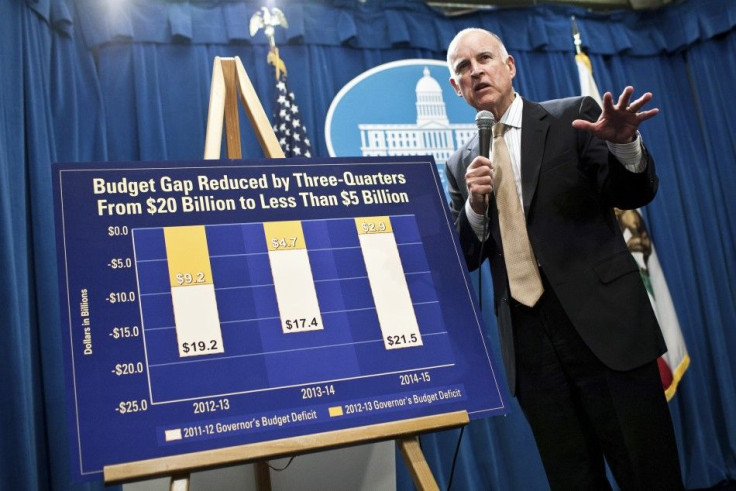California Budget Gap Widens To $16B From $9B [TRANSCRIPT, VIDEO]

The estimate of California's budget deficit in its next fiscal year has ballooned to $16 billion from $9 billion, state Gov. Edmund G. (Jerry) Brown Jr. divulged in a YouTube video posted Saturday.
Brown said the widening gap was caused by changing conditions on both the revenue and the cost sides of the ledger: Tax receipts are coming in lower than expected. And the federal government and the courts have blocked us from making billions in necessary budget reductions. The result is that we are now facing a $16 billion hole, not the $9 billion we thought in January.
Therefore, Brown said: This means that we will have to go much further and make cuts far greater than I asked for at the beginning of the year. But we can't fill a hole of this magnitude with cuts alone without doing severe damage to our schools. That's why I'm bypassing the gridlock and asking you, the people of California, to approve a plan that avoids cuts to schools and public safety.
Bypassing the gridlock is code for short-circuiting the legislative process.
In the California Legislature, minority Republicans are generally unhappy with proposals to increase revenue (e.g., income taxes) and majority Democrats are generally unhappy with proposals to decrease costs (e.g., health-care coverage). Which means Brown is between a rock and a hard place on budgetary matters.
Brown thus employed the YouTube video as a way to exhort the California electorate to cast their ballots for his budget-related initiative in the general elections on Nov. 6. (Both a transcript and the video itself appear at the bottom of this article.)
With a dash of euphemism, Brown described the initiative this way, The plan asks high-income earners to pay up to 3 percent more in their income taxes for seven years.
Moreover, Brown said: It would increase sales taxes by one-fourth of 1 percent for four years. Even with this modest increase, sales taxes will be lower -- that's right, lower -- than they were a year ago.
In addition, Brown said: [M]y plan will establish a constitutional guarantee for public-safety funding at the local level. It will also save billions in prison costs.
According to the Democratic governor, What I'm proposing is not a panacea, but it goes a long way toward cleaning up the state's budget mess.
Why should anyone but Californians care about this? Well, it may be only one of 50 states, but it is the biggest of them all, in terms of government expenditures and population.
If California were a country, then it would have ranked No. 20 in government spending among all nations in the world in its 2009-10 fiscal year. Its budgetary joys and sorrows are felt beyond its geographic borders.
With the change in the deficit estimate in mind, Brown will release his revised budget proposal for the 2012-13 fiscal year on Monday at press conferences in the state's capital city of Sacramento and in its largest city of Los Angeles.
The Sacramento press conference will be streamed live online via the California Channel, circa 10 a.m. PDT (1 p.m. EDT). A copy of the revised budget proposal will be posted online shortly after the beginning of the news conference.
Below is a transcript and the video itself:
Address to the People of California: Governor Brown Discusses 2012-2013 State Budget -- Transcript
Hi. I'm Governor Jerry Brown.
When I took office last year, California faced a staggering deficit of over $26 billion and red ink as far as the eye could see. State revenue had dropped 24 percent, and budget after budget was patched together with Scotch tape and gimmicks.
In my first month, I proposed a tough combination of spending cuts and temporary tax extensions to put our state back on track. I worked with the Legislature to enact billions in painful spending cuts from welfare and Medi-Cal to prisons.
And when the Legislature passed another gimmicky budget, I did something that had never been done in our state's history. I vetoed it. I knew we had to do better. And we did.
As a result of the actions we took, California's bond rating went from a negative outlook to positive.
And state spending is now at its lowest level in decades. Unfortunately, our work is not finished. We're still recovering from the worst recession since the 1930s.
Tax receipts are coming in lower than expected. And the federal government and the courts have blocked us from making billions in necessary budget reductions.
The result is that we are now facing a $16 billion hole, not the $9 billion we thought in January.
This means that we will have to go much further and make cuts far greater than I asked for at the beginning of the year. But we can't fill a hole of this magnitude with cuts alone without doing severe damage to our schools.
That's why I'm bypassing the gridlock and asking you, the people of California, to approve a plan that avoids cuts to schools and public safety.
The plan asks high-income earners to pay up to 3 percent more in their income taxes for seven years.
It would increase sales taxes by one-fourth of 1 percent for four years. Even with this modest increase, sales taxes will be lower -- that's right, lower -- than they were a year ago.
Last but not least, my plan will establish a constitutional guarantee for public-safety funding at the local level. It will also save billions in prison costs.
What I'm proposing is not a panacea, but it goes a long way toward cleaning up the state's budget mess. Please, join me in getting our state back on track and investing in our common future.
© Copyright IBTimes 2024. All rights reserved.





















